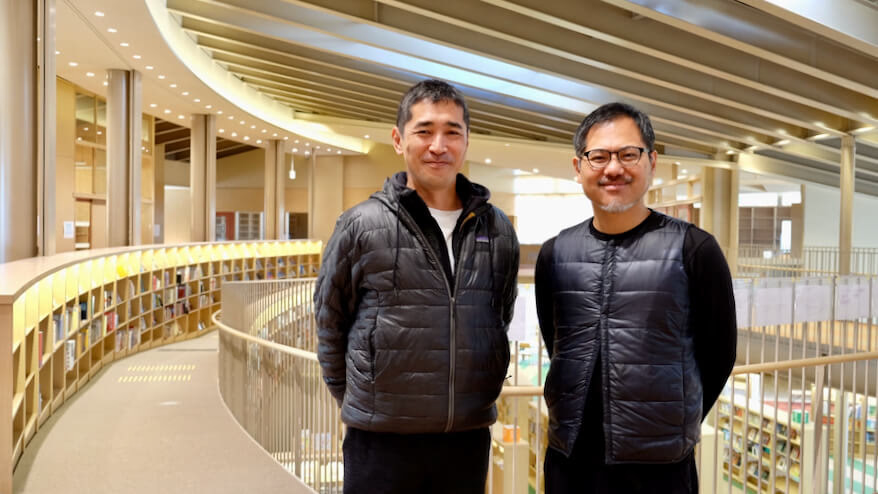はじめまして。フリーランスライターの池田美砂子です。保育や教育といった子どもまわりに心惹かれ、取材・執筆を重ねています。今回はライター友達の杉本恭子さんからご縁をいただき、ものさすサイトで初めて書かせていただくことになりました。
今回の記事のテーマは「自由の扱い方」です。モノサスの代表・林さんは最近、組織づくりにおける"自由"についてお悩みの様子。相談相手としてラブコールを送ったのが、岩瀬直樹さん(通称「ゴリさん」)。昨年4月に開校したばかりの幼小中混在校・軽井沢風越学園(以下、風越)の校長先生です。風越のWebサイトをモノサスがつくったご縁で、ふたりは出会いました。
学校と会社。組織のかたちは違いますが、風越とモノサスには、"自由"に対する考え方において、たくさんの共通点がありそうです。ゴリさんとの対話を通して、果たして林さんの悩みは晴れるのでしょうか?
まだ暖かった初冬のある朝、私は杉本さんと一緒に軽井沢へ。風越自慢のライブラリーの一角で交わされた約2時間の対談の様子を3本に渡ってお届けします。
-
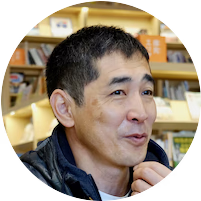
-
岩瀬直樹さん(ゴリさん):
軽井沢風越学園の校長・園長。22年間の公立小学校教諭経験をいかして、学習者中心の授業・学級・学校づくりに取り組む。普段は校内をうろうろ。子どもが本を抱えている姿が大好物。
-
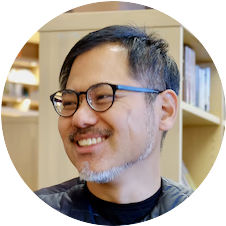
-
林隆宏:
モノサスの代表。2020年4月、風越の開校直前に軽井沢に移住。風越に通う2人の娘と妻とともに、風越コミュニティのなかで暮らす。料理に加えて、焚き火とDIYを趣味に追加。
いろいろなものさしがある中で、
人は「自分になっていく」。
杉本:まずはお互いのことをどう見ていらっしゃるか教えていただけますか?
林:岩瀬さん、モノサスの印象ってあります?
岩瀬:風越のWebをつくるときに、広報の辰巳真理子さん経由で知りました。その後、「風越コラボ」というイベントにフードハブの樋口明日香さんが来てくださっていて、たくさん話して。僕も一度神山にお邪魔してモノサスのオフィスを覗いたりして、面白そうな人が集まっている会社だな、と。スタッフそれぞれの粒が立っているような印象ですね。
林さんとのつながりは、風越が始まってからですね。どちらかと言うと、林さんの娘さんたちと先に出会ってる。
林:そうでしたね、Webの打ち合わせもお会いしたのは数回でしたからね。
僕が風越を知ったのは、それこそWebの話のときでした。TOECとの出会いで教育について考えたり、会社の自由度を上げたいという想いもあったり、風越につながる話はけっこう語れば長いんですが。
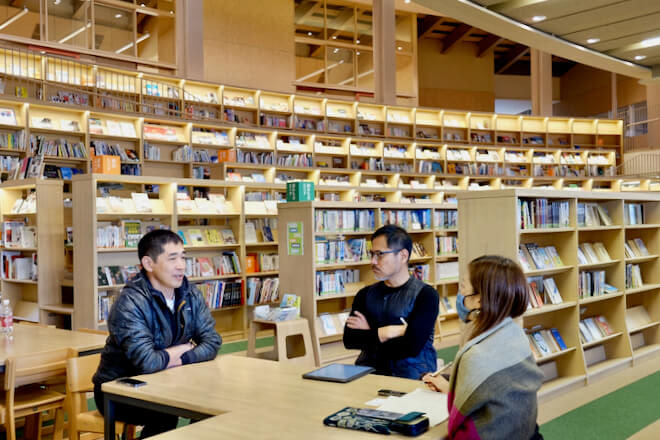
林:僕が風越に一番共感しているのは、「ノアの方舟じゃない」というところです。有能な人だけを集めていい組織をつくっても実は社会的な意味はあまりないと思っていて。風越が大事にしているのは、エリートを育てることではなく、自分自身になっていくプロセスをつくっていくということじゃないかな、と思ったんです。
僕の中で、人って自分自身になりさえすれば必ず幸せになれるという確信みたいなものがあるんですよ。僕はそれを会社という枠でやってみたいんだけど、風越は学校という枠組みの中で社会に浸透させていくんだな、と。
でも僕らの世代はそういう学校がなかったから、今までの社会に適応してきたガチガチの人たちも多くて、めっちゃ大変なんですよ。
岩瀬:うん、めっちゃ大変。
林:モノサスはこれまで教育的要素が強い面がありました。稼ぎ方をトレーニングするのと同じくらい、自分自身になっていくプロセスを大事にしようとしてきたんですが、全然うまくいかなくて。だから今日は岩瀬さんに悩み相談を。
岩瀬:僕も悩みしかないですけどね(笑)。
林:お互い悩みを吐露する会ということでどうですか?
岩瀬:いやぁ、でも始めてみて難しいな、と思うことはたくさんあります。学校って、何を成果にするかわからないところがあって。「自分になっていく」って人それぞれで、自分の仕事に手応えを持てる瞬間も価値観も、本当に人によって違うんですよね。それが育ちの場をつくっていくことの面白さであり難しさでもあるな、と感じています。
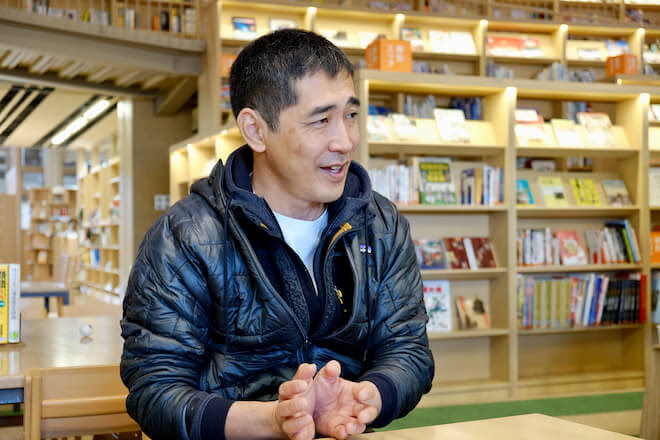
岩瀬:たとえばいま、入口のところに水槽がいっぱいあるんですけど、5年生のシンノスケが水族館をつくっているんです。この前、「ゴリさん、水族館行ったらどういう魚見る?」って聞かれて、「エイとかかな」って言ったら、「でしょ?こういう地味な魚、絶対見ないでしょ?僕は地味な魚にも美しさがあるってみんなに知らせたいからここに水族館をつくる」って。
林:ふふふ。
岩瀬:でも、しれっとそこにいて、他の授業行かなかったりするんですよ。僕は面白いなと思って見ていて、本人も「僕はみんなの学びに貢献しているから」とか言っていて。
林:面白い。
岩瀬:でも、授業に出ないことが気になる大人もいる。子どもも大人も、そういうひとつのものさしじゃない環境の中で育っていくというのは、簡単そうで難しいなというのは感じています。やっぱりスタッフにとっては、シンさん(理事長の本城愼之介さん)や僕の存在が気になるし、そこを手放すにはどうしたらいいかな、というのは目下の僕の課題意識です。
林:手放すのは難しいし、「本当に手放したいか?」というのも無いですか?
岩瀬:そうなんですよね。手放したいわけじゃなく、僕も持っていたい。でも僕の存在が上下じゃなくて横の広がりとして置かれるにはどうしたらいいかな、と。
その点、子どものほうが圧倒的にフラットで、お互いがやっていることを面白がれる。シンノスケなんて、前期(幼稚園年少〜小学2年生)のみんなのヒーローですからね。みんな虫を捕まえたらシンノスケのところに行って「これ、なんて虫?」って聞くんです。
林:へぇ。
岩瀬:そんな中で彼は最近、「俺、国語とか算数もがんばってる」とか言うんですよね。
林:ふふふ。授業遅れるくせに?
岩瀬:そう、「俺なりに目標決めてこのテスト終わりにしてる」って言って、本当に終わらせてるらしいんですよ。「そういうのもちゃんとやっておこうかな、と思って」とか言い始めて(笑)。
確かな自分の成長の手応えみたいなものを感じると、関心の領域や手を伸ばせる領域が広がるな、って感じますね。
シンノスケくんが水槽をつくっていく様子が動画にまとめられています。
頑張って手放したら、戻って来ない......。
自由の先のエンジンを動かすためには?
岩瀬:風越の良さは、子どもが大人の顔色をあまりみないところにあるな、と思っていて。廊下で算数やっていたり、暇つぶししちゃっているような子に対しても、「まあいいじゃん」ってとがめない人が多い。
人ってそういう中で育っていくな、という感じはあります。その自由度がないと、自分が好きなことや居心地いいと感じるものに出会えないんじゃないかな、って。でもそれを大人の環境と等しくするのは難しい。
林:自由の扱い方って難しいですよね。モノサスでも手放していくために、2年くらいかけて会社のなかの仕組みを変えてきたんですよ。でも手放したままコロナで在宅ワークになったから、「糸の切れた凧が50個散らばった」みたいになっちゃったんじゃないかと不安になってしまって。これはどうにかせねばと出社推奨デイを決めて会社に行ったら、「11時なのにまだ誰も来てない」みたいな(笑)。
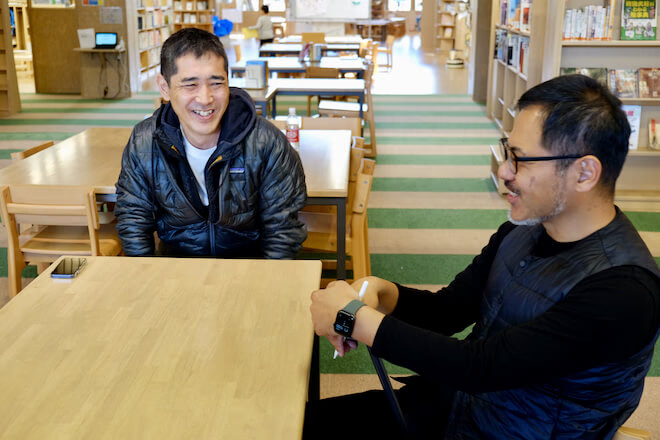
岩瀬:ははは。
林:こいつら〜みたいな(笑)。まだ完全に手放しちゃいけないんだな、と思いました。
岩瀬:どうして完全に手放しちゃいけないと思いますか?
林:うーん。新しいことがなかなか始まらないんですよ。在宅ワークって、それまで流れていた仕事をこなしていくには自由もあるし、快適なんだと思います。生産性もほとんど落ちないこともわかりました。でも、新しいことを始めるようなエンジンをもう1回動かすことができない状態なんです。
岩瀬:そこのエンジンみたいなものは何だと林さんは思っているんですか?
林:もともとは自分や一部のメンバーがエンジンだったんですよ。それを個人が持てるようにしようと思って、3〜5人のユニットに分けたんです。そのユニットが個別にエンジンになっていくといいな、と。
池田:そのエンジンが動いていない?
林:動いていないというか、ユニットの体制になって「さあこれから」という時にコロナが来てしまい、自律的にエンジンがかかっている状態ではない感じですね。それに対して、風越の先生たちは、顔色は見つつもエンジンはまわっているな、という感じがあります。
岩瀬:実は風越でも同じようなことがありました。
林さんはご存知の通り、小学3〜7年生の子どもたちは約6週間のプロジェクトで学びを進めるんですね。学年の近い子どもたち20名くらいでプロジェクトを組んで、そこに3名ほどのスタッフが伴走する。複数のプロジェクトが同時に走り、「プロジェクトアウトプットDAY(学びの成果発表の場)」までを一区切りとしていて、いま、開校してから3本目に入っているところで。
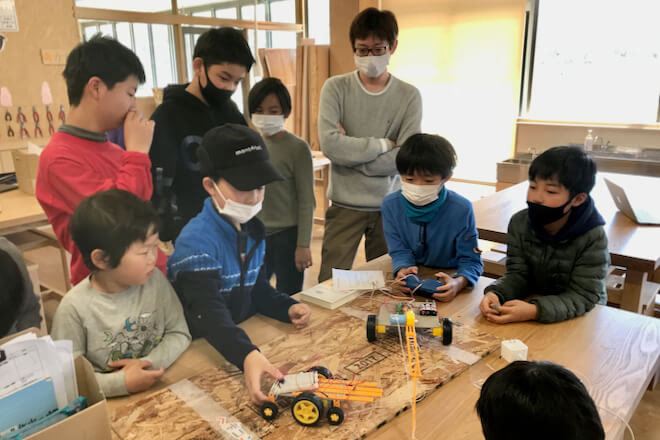
個人探究のプロジェクト「セルフビルド」の様子。年長から小学6年生の子どもたちが入り混じり、「ヘボコン」(技術力の低い人限定ロボット相撲大会)に向けてロボットづくりに取り組んだそう。(提供:軽井沢風越学園)
岩瀬:1本目はすごくいい感じだったんです。休校、分散登校からやっと通常登校になって、集まれていることがうれしくて子どもも大人も熱量高く終わったんですね。
でも2本目で停滞しました。それぞれプロジェクトメンバーだけで考えるということをやってみたらうまくいかなくて、5個のプロジェクトが孤立した。
それで3本目では、大きく3つのテコ入れをしました。1つは何人かのスタッフに対して、「手慣れの仕事はやめよう」と。経験からくる「子どもはこうなるだろうな」とゴールが見えているようなものはやめて、自分も絶対ゴールが見えていないことを思い切ってやろう、と声をかけました。
2つめは、全部のプロジェクトに入ってチューニングする大人を置いたんですよ。たとえばライブラリーの先生はライブラリアン(司書教諭)の角度から、国語や理科、社会、図工の先生もそれぞれの観点からアドバイスする、という感じで。
林:ちょっとメモっていいですか?
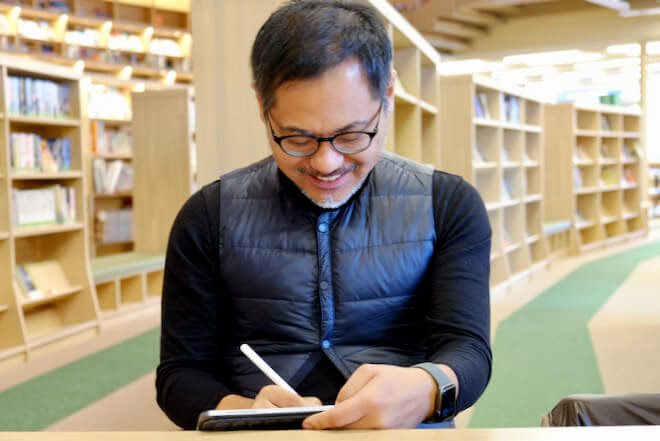
岩瀬:どうぞどうぞ(笑)。そうすると、その人たちには全部のプロジェクトが見えているのでアイデアの交換が生まれますし、プロジェクトメンバーが彼らに相談することも増えました。プロセスに関わる人が増えて、プロセスを開示する人も増えた。お互いのやっていることを面白がる人も明らかに増えて、結構いい感じに進んでいるんです。
林:なるほどーー!!
岩瀬:3つめは、各プロジェクトでその日の学びを記録するスタッフを置きました。写真を撮りながら記録して、終わったらそれをすぐオフィスに張り出して、保護者にも見てもらえるようにして。要は、お互いのやっていることを見えるようにしたんですね。その結果、週1回そのドキュメンテーションを持ち寄って、フィードバックしあおう、というのもやり始めていました。
林:そのドキュメンテーションは、誰が書いているんですか?
岩瀬:それが面白いことになっていて、最初は大人が書いていたんですが、いま「森の生活」っていうプロジェクトでは子どもが書き始めていて。お見せしましょうか。子どもが毎時間書く授業記録、すっごい面白いんです。
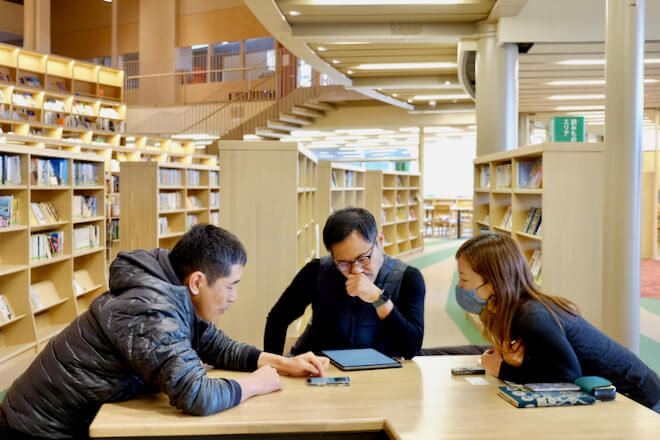
林:すげー!
池田:これは子どもたちから「やりたい」と?
岩瀬:そうらしいです。大人がやっているのを見て、記録していくことが面白くなったんでしょうね。
林:すげーな、子どもって。
岩瀬:いや、子どもは本当にすごいんですよ。何人かは、大人並みのドキュメンテーションをやっていて、自分たちの学びをちょっとメタ的に見られるようになっているんです。
林:へーー!!
岩瀬:要は僕、つなぐ作業を一生懸命しているんです。学校の教員って、自分のやりたいことをやりたいようにやりたい人たちが多いので、放っておくと孤立する。だからつなぐことを意識したんですが、これがけっこういい感じで、アドバイスも届くようになってきているんですよね。
林:なるほどなぁ。
ゴリさんの体験談に、メモを取りながら食い入るように聞き入っていた林さん。私もその隣で、自分の体験と照らし合わせながら思考を巡らせていました。
今回のお話でなんとなく見えてきたのは、どうやら大人の複雑に絡まった思考を解きほぐすヒントは子どもの言動の中にありそうだということ。まわりの顔色を見ずにやってみる、臆することなく大人の真似をしてみる。そういったシンプルな行動を繰り返し、子どもは驚くほどの成長を見せている。そんな子どもたちをお手本に、組織づくりをしてみたら......?
自由の先のエンジンを動かすヒントが見えてきたような、まだ見えていないような......。お悩み相談[その2]に続きます。
